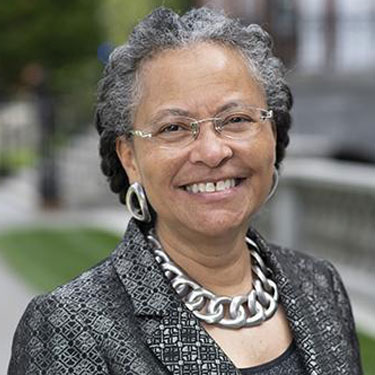2021-22 UCSF Presidential Chair Award Recipient - Camara Phyllis Jones, MD, MPH, PhD

Vice Provost Brian Alldredge named Dr. Camara Phyllis Jones to a one-year term as UCSF Presidential Chair through June 30, 2022.
The UCSF Presidential Chair Award is intended to encourage new or interdisciplinary program development or to enhance quality in existing academic programs of the University. UCSF allocates Presidential Chair funding of up to $150,000 to support the appointment of a distinguished visiting professor for up to one year.
As UCSF Presidential Chair, Dr. Jones will engage with UCSF partners to create an equity roadmap at UCSF guided by three principles: valuing all individuals and populations equally, recognizing and rectifying historical injustices, and providing resources according to need. Dr. Jones will provide a framework for naming racism and moving to action that acknowledges that racism exists, racism is a system, racism saps the strength of the whole society, and the UCSF community can act to dismantle racism. She will guide the application of the question “How is racism operating here?” to identify levers for intervention within the UCSF context to dismantle racism (and other systems of structured inequity) in health science, education, academic careers, care delivery, and discovery.
Jones was nominated for the UCSF Presidential Chair Award by Anda Kuo, MD, clinical professor in the Department of Pediatrics, School of Medicine with broad support from faculty and leadership from all four schools, campus administration and UCSF Health.
About Camara Phyllis Jones, MD, MPH, PhD
Camara Phyllis Jones, MD, MPH, PhD is a family physician and epidemiologist whose work focuses on naming, measuring, and addressing the impacts of racism on the health and well-being of the nation.
Dr. Jones recently completed tenure as the 2019-2020 Evelyn Green Davis Fellow at the Radcliffe Institute for Advanced Study at Harvard University.
She is also a Senior Fellow at the Satcher Health Leadership Institute at the Morehouse School of Medicine; an Adjunct Professor at the Rollins School of Public Health at Emory University in the Department of Behavioral Sciences and Health Education and the Department of Epidemiology; and an Adjunct Associate Professor at the Morehouse School of Medicine in the Department of Community Health and Preventive Medicine.
Past roles include Assistant Professor at the Harvard School of Public Health in the Department of Health and Social Behavior, Department of Epidemiology, and Division of Public Health Practice (1994 to 2000); Medical Officer at the Centers for Disease Control and Prevention (CDC) in the Division of Adult and Community Health, National Center for Chronic Disease Prevention and Health Promotion (Research Director on Social Determinants of Health and Equity, 2000 to 2010) and in the Division of Epidemiologic and Analytic Methods for Population Health, Office of Surveillance, Epidemiology, and Laboratory Services (2010 to 2014); and President of the American Public Health Association (2015 to 2016).
At the CDC, Dr. Jones led the development and inclusion of the six-question “Reactions to Race” module on the Behavioral Risk Factor Surveillance System, and the organization and formalization of the CDC Racism and Health Workgroup as an official CDC scientific workgroup. As President of the American Public Health Association, she launched the 25,000-member association and its 54 state affiliates (with another 25,000 members) on a National Campaign Against Racism.
She is currently a member of the National Academies of Sciences, Engineering, and Medicine’s Roundtable on Black Men and Black Women in Science, Engineering, and Medicine; the National Board of Public Health Examiners; the Board of Directors of the DeKalb County [Georgia] Board of Health; and a faculty member of the Accreditation Council for Graduate Medical Education’s Quality Improvement: Health Care Disparities Collaborative.
Dr. Jones earned her BA in Molecular Biology from Wellesley College (1976); her MD from the Stanford University School of Medicine (1981); her Master of Public Health from the Johns Hopkins School of Hygiene and Public Health (now the Johns Hopkins Bloomberg School of Public Health) (1982); and her PhD in Epidemiology from the Johns Hopkins School of Hygiene and Public Health (1995). She also completed residency training in General Preventive Medicine at the Johns Hopkins School of Hygiene and Public Health (1981 to 1983) and residency training in Family Practice at the Residency Program in Social Medicine at Montefiore Medical Center (1983 to 1986).
